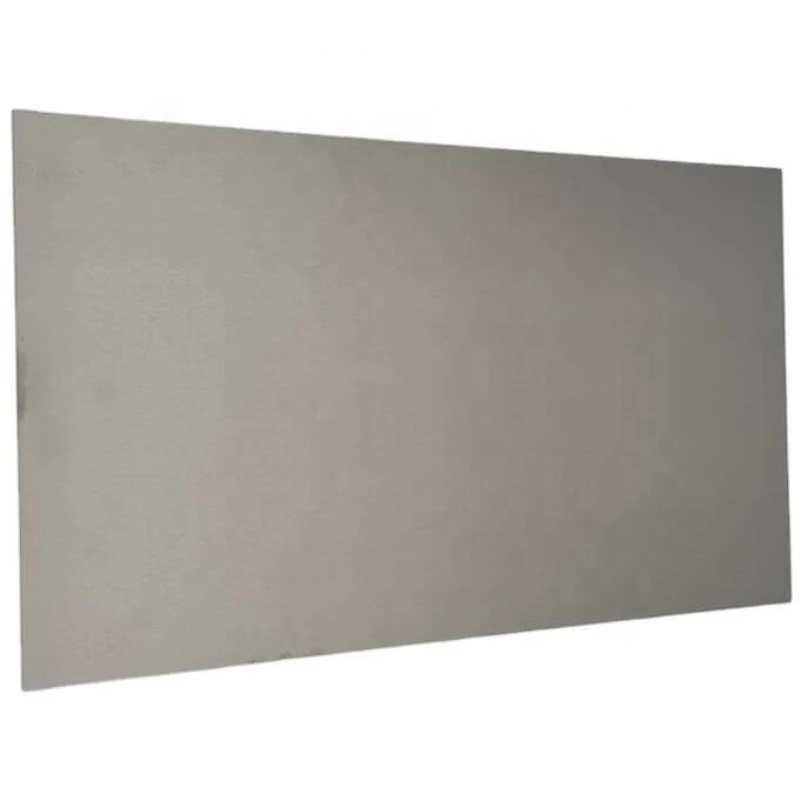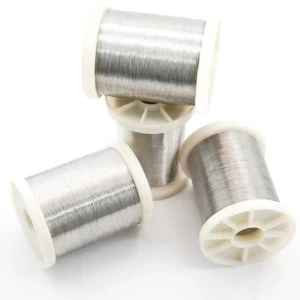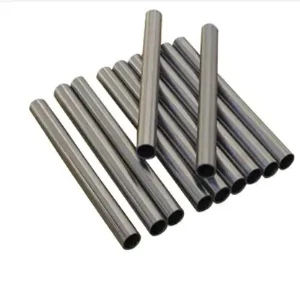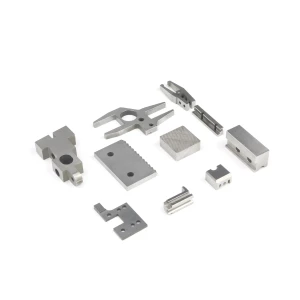Niobium plates usually refer to plates made of niobium (element symbol Nb). Niobium is a rare metal with silvery white luster. It is a transition metal and a refractory metal. It is located in the fifth period and group VB of the periodic table of elements. Below are some properties and applications of niobium plates.
| Product name | 99.95% Niobium Sheet Niobium Plate |
| Purity | Nb ≥99.95% |
| Grade | R04200, R04210, R04251, R04261, Nb1, Nb2 |
| Standard | ASTM B393 |
| Size | Customized size |
| Melting point | 2468℃ |
| Boiling point | 4742℃ |
| Advantage | Low Density and High Specificate Strength |
| Excellent Corrosion Resistance | |
| Good resistance to effect of heat | |
| Nonmagnetic and Non-toxic | |
| High melting point, good anti-corrosion, excellent super-conduction and other unique characteristics. | |
| Application | Electronic industry, Chemistry, Electronical, Pharmaceutical industry. |
| Steel, Ceramics, Electronics, nuclear energy industries and superconductor technology. | |
| Super condouctous, metled cast ingots and alloying agents. | |
| Widely used in manufacturing various kinds of alloy steel, high temperature alloy, optical glass, cutting tool, superconducting materials and other industries. |
Plate Size(0.1~6.0)*(120~420)*(50~3000)mm:
Thickness
Thickness tolerance
Width
Width
Length
length
tolerance
length
0.1~0.2
±0.015
20~1000
±2.0
20~2000
±2.0
0.2~0.3
±0.02
20~1000
±2.0
20~2000
±2.0
0.3~0.5
±0.03
20~1000
±2.0
20~2000
±2.0
0.5~0.8
±0.04
20~1000
±2.0
20~2000
±2.0
0.8~1.0
±0.06
20~1000
±2.0
20~2000
±2.0
1.0~1.5
±0.08
20~1000
±1.0
20~2000
±1.0
1.5~2.0
±0.10
20~1000
±1.0
20~2000
±1.0
2.0~3.0
±0.12
20~1000
±1.0
20~2000
±1.0
3.0~5.0
±0.15
20~1000
±1.0
20~2000
±1.0
5.0~8.0
±0.18
20~1000
±1.0
20~2000
±1.0
8.0~12.0
±0.20
20~1000
±1.0
20~2000
±1.0
12.0~15.0
±0.50
20~1000
±1.0
20~2000
±1.0
15.0~2.0
±0.80
20~1000
±1.0
20~2000
±1.0
Grade
Dimensions
Type
Thickness/mm
Width/mm
Length/mm
R04200
0.05
300
>300
Foil
R04210
>0.1~0.5
50~450
100~10000
Strip
R04251
>0.5~0.8
50~450
50~2000
Plate
R04261
>0.8~2.0
50~650
50~2000
Plate
>2.0~6.0
50~650
50~1500
>6.0
50~650
50~1500
Note: Customized size also accepted
Chemical Composition (MAX)
Grade
R04200
R04210
R04251
R04261
Nb Content%
Remain
Remain
Remain
Remain
Impurity content (%)≤
Fe
0.005
0.03
0.01
0.04
Ni
0.005
0.01
0.005
0.01
W
0.03
0.05
0.05
0.05
Si
0.005
0.02
0.01
0.03
Mo
0.01
0.05
0.02
0.05
Cr
0.002
0.01
0.005
0.01
Ti
0.002
0.005
0.005
0.01
Ta
0.01
0.25
--
--
O
0.015
0.025
0.03
0.06
C
0.01
0.02
0.03
0.05
H
0.001
0.005
0.002
0.005
N
0.015
0.05
0.035
0.05
Characteristic:
1. High melting point: The melting point of niobium is approximately 2468°C, making it excellent in high temperature applications.
2. Corrosion resistance: Niobium has good corrosion resistance to most acids and alkalis and maintains this property even at high temperatures.
3. Superconductivity: Pure niobium has superconducting properties at low temperatures, that is, it can conduct current without resistance below the critical temperature.
4. Good mechanical properties: Niobium can maintain good strength and hardness even at high temperatures.
5. Biocompatibility: Niobium has good compatibility with human tissues and is suitable for medical device manufacturing.
Application:
1. Electronics industry: used as substrate or diffusion barrier layer for electronic components, and as capacitor materials in the production of very large scale integrated circuits (VLSI).
2. Superconducting magnets: Superconducting magnets used in particle accelerators and magnetic resonance imaging (MRI) equipment.
3. Chemical engineering: As a material for chemical reactors and pipelines, utilizing its high temperature resistance and corrosion resistance properties.
4. Aerospace: Used in certain components of spacecraft and rockets, especially those that require high temperature resistance.
5. Medical devices: used to manufacture implantable medical devices, such as pacemakers and artificial bones.
6. High temperature furnaces and heating elements: Due to its high melting point, it can be used as an integral part of industrial furnaces or heating equipment.
7. Decoration and Crafts: Due to its appearance and durability, niobium can also be used in high-end decorations and crafts.
Due to niobium's high reactivity and processing difficulty, the production and processing of niobium plates often require special technology and equipment. Additionally, niobium plates and their products are generally more expensive due to niobium's rarity and refining costs. As technology advances, the application of niobium plates may further expand, especially in high-tech fields that require extreme environmental stability.
We have more categories for you. lf you can't find the products you want above,just fill in the form and tell us whatproducts you want to import from China.
















